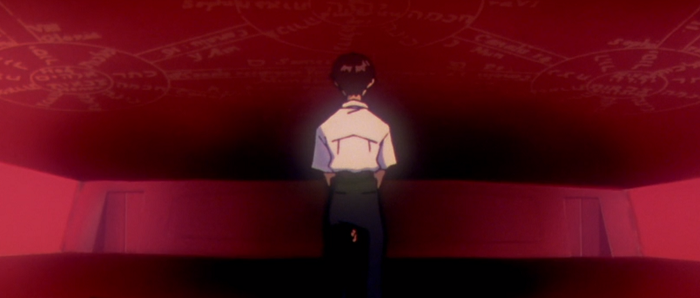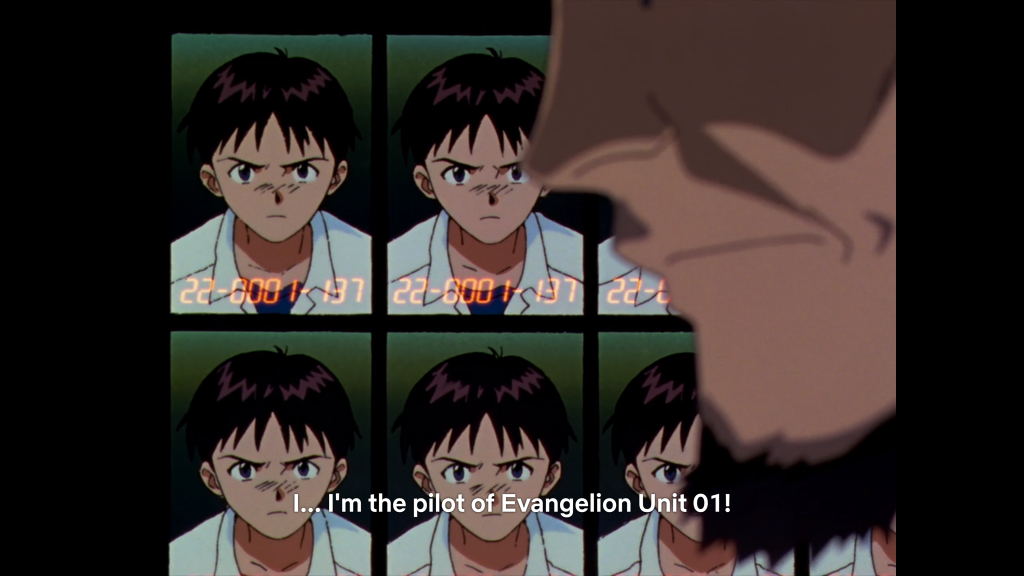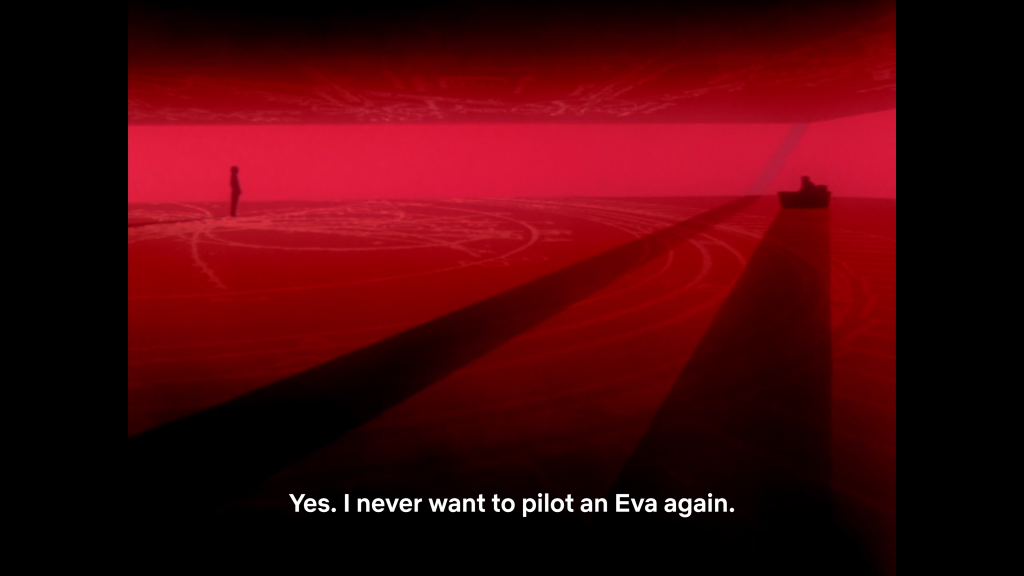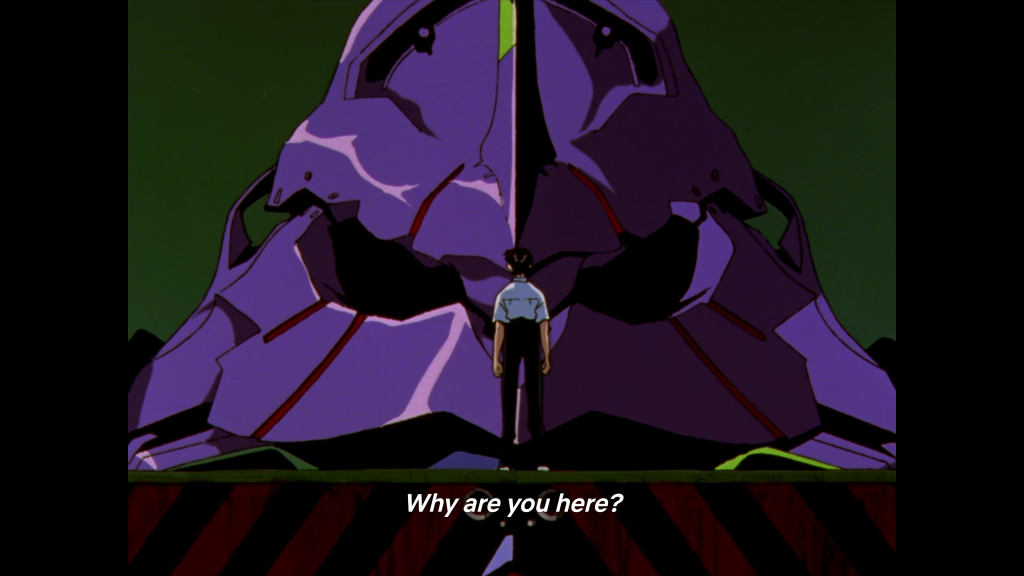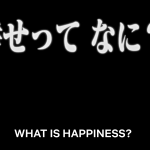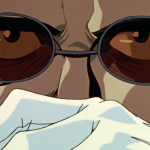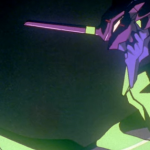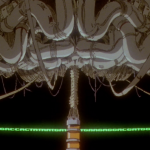Revangelion: Part 19 – A Cruel Man’s Battle
All of this has happened before. We’ve seen Shinji pitch a fit and refuse to pilot his Eva. We’ve seen Gendo treat Shinji like a disposable meat puppet. We’ve seen Misato fail to walk the line between a commanding officer and a surrogate mother. And, we’ve seen the threat of an Angel attack lead Shinji back to NERV and Eva-01’s entry plug.
From the first utterance of “I quit,” the audience knows they are treading a well-worn path with episode 19, and I suspect the writing knows it, as well. Otherwise, there would be no reason for all of the set pieces that serve to call back to previous episodes. Shinji’s dramatic declaration that he is, indeed, the pilot of Evangelion 01 is delivered with the same visual gambit that breaks Shinji into multiple visions of himself on monitors. It reminds the audience that he was, and remains, a piece of Gendo’s plan.
Cool. Very FILM 201. Except, I’m a busy man who knows that Shinji is in agony. The writing showed me that with his scream to end all screams at the end of the last episode. I really didn’t need another trip on the train of emotional reflection, where Bizarro Rei tells Shinji that he needs to stop running from his pain feat. Suzuhara watching the entre exchange because now that he’s an Eva pilot I guess he’s operating on the same psychic wavelength as Shinji?
Or maybe Shinji is just insane, and none of this matters.
I suspect Suzuhara’s immersion in LCL has led to his joining a small gestalt shared between the Eva pilots. There’s no reason for me to suspect this explanation other than instinct gained through spending too much time working this series and doing the mental math that the writing is content to outsource to the audience. Remember, there is no secret tome of wisdom to Evangelion; there is only a sunk cost.
Don’t look at me that way. At this point, nobody is more frustrated with my past self than I am. I keep locking on to things that seem important in the moment, but ultimately don’t matter toward the longer arc – if we want to call what Evangelion is doing an arc. Conventional metaphors to describe a writer playing at a long con fail in this instance. I refuse to call a dozen Angel attacks foreplay because that implies a degree of pleasure in the experience. All of this is negotiation, a long bothering, tedious negotiation.
At least my past-self’s spirits seem suitably crushed with this episode’s utter failure to deliver on the promise of episode 18.
On a related note, I hope my therapist doesn’t ever find out about this project. I really don’t feel like explaining how I’m not Mr. Robot, and this is all a device for narrative deconstruction.
So if we’re not learning anything new, if all we are doing is enduring the writing as it explains things to us that we already know – save for maybe the last six minutes of the episode, which are considerably important – what are we doing here?
I expect there is a conversation to be had on how Shinji was ready to take Eva-01 on a rampage against NERV. NERV’s staff point out that Gendo’s use of the dummy plug system saved both Shinji’s life and the lives of everybody in NERV HQ. Shinji’s response is to say that he doesn’t care. He doesn’t see his life as having more value than Suzuhara’s, nor does he accept the utilitarian proposition that saving the lives of his co-workers would have been worth his friend’s life. Shinji walks away from NERV because the kid who wants to make everybody happy has decided that he doesn’t care if everybody dies.
There but before the grace of the gods goes a teenager with a sense of righteous indignation.
The writing revisits this beat during Shinji’s battle with Zeruel, the fourteenth Angel. After Eva-01’s power runs out, Shinji begs the robot to move. He then delivers the knockout line, “If I can’t do this now, then everybody is going to die. I don’t want that, not anymore.”
Shinji quit NERV because he told himself that he no longer cared if the people in his life, his co-workers and school chums, alike, died. This is psychic pay-off from the last episode’s agony: the reality of war expanding Shinji’s personality into a place where genuine nihilism can exist.
Is it, though? Is that really what is happening, or is it Shinji walking back words said in the heat of the moment? How many teenagers have wished death on their parents only to offer teary apologies the next day? Past-Adam is likely overcomplicating things and doing exactly what this story expects of him: emotional heavy lifting to add layers of nuance to an otherwise flat story.
This also returns us to a fundamental question on if Hideki Anno expects the audience to buy into the idea that Shinji’s actions are all part of Gendo’s plan. To accept an ordered internal narrative requires embracing the determinism of Evangelion’s take on the Dead Sea Scrolls, which have apparently been leading Gendo toward Human Instrumentality. Moreover, we need to accept that Gendo believes enough in the predictability of his son, or his dummy plug hardware, that he is willing cut loose the key to his defense against the Angels. All of this feels like a huge conceptual leap.
If we call it a leap of faith, it is in keeping with my notion that Evangelion is a dogma and not a story. Evangelion in conversation with Catholicism would feel freed from the burdens of internal narrative because the solution to plot holes in the bible is faith.
The other interpretation is that Kaji as surrogate…well not father but at least bad-influence-uncle-with-a-heart-of-gold, offers the nudge that Shinji needs to get off the fence and pilot Eva-01. Shinji chooses to leave the train station and return to NERV because the memory of Kaji shames him to action.
cough…shame is Catholicism’s weapon of choice…cough
That seems a lot more like freedom of choice than the determinism inherent to an ancient prophecy.
I’m not going to bother going down that rabbit hole to offer an answer one way or another. It’s enough to recognize that a discourse on determinism and free will ran off with another discourse on deontological ethics vs situational ethics in this episode. To wit, piloting the Eva to save humanity from a third impact is probably the right thing to do, but does Shinji have a broader duty to walk away from NERV and Gendo’s machinations since he now knows his father is evil? Then again, is there any way for Shinji to know his duty if he is perpetually being manipulated by the people around him such that he can’t see the good in the world?
Let’s pop back to the train sequence. There’s a reason that Suzuhara isn’t riding in the same compartment as Shinji. Shinji routinely wakes up from battle to empty rooms that make him question why he is fighting for other people. Suzuhara, in contrast, wakes up to thoughts about his sister and the company of the class rep. The cornerstone of Suzuhara’s character, besides being a creep, is a demonstrated duty to his sister. There’s no crisis of self-identity to his becoming a pilot; whereas Shinji is a pilot, in part, for the approval of a man he now passionately hates and people who believe more in his father than they do in him.
Gods below, is there ever a moment when this series isn’t work?
There are, thankfully, blessedly, a few moments of clarity to be found amid the moral quagmire. The first is that Zereul’s drive for NERV HQ leads to Kaji telling Shinji that if an angel comes into contact with Adam it will bring about the third impact. I submit he’s wrong, and the Angels are trying to save us from Gendo, but at least there’s some shred of motivation for the constant attacks on Tokyo-3 that contextualizes the Angel in a basement cutaway from a few episodes back.
The second revelation comes when Eva-01, while 400% synchronized with Shinji and operating outside of its battery limit, begins eating the defeated Zereul to the horror of NERV’s murmuring idiots. Ritsuko asks if she, Eva-01, is awake before explaining that the Eva’s armour is actually a restraint on its power. Kaji asks if the howling Eva, deemed liberated and awakened from its human bondage, was part of Gendo’s plan. Watching from his obscenely oversized office, Gendo states that “it all starts now.”
It all starts now. For real, why didn’t it start ten episodes ago? Instead of spending entire episodes having Shinji apologize for everything while other characters shout about his being “too intropunitive” maybe the writing could have poured some gas on the situation.
I really wanted this episode to be the big delivery on episode eighteen’s trauma. Through one lens we get some of that, but the ending makes me question if it was anything more than a return to zero. For all the deep reading that one can offer on psychic train rides, predestination, and freedom of choice, what happened here other than a hard reset?
What was accomplished beyond re-piloting episode one into a more conventional anime framework of the hero rising to the occasion despite their fears and anxieties?
A note from a version of me who has finished watching the entirety of the series, for a third and final time, and is now free to connect the dots that past-Adam could not quite see:
It is worth noting that there are three episodes between this one and the coming of the final angel, the one Netflix’s translator reduced to Shinji’s buddy rather than his boyfriend. Three episodes of beat poetry introspection, flashbacks to Asuka begging Kaji to fuck her, and the oral history of NERV’s creation. My past-self called episode 19 a re-pilot, but the point of a re-pilot is to bring everybody up to speed on major changes within a single episode.
What follows doesn’t harmonize with everything seen in episode 19. In fact, I think it largely puts what happens here on ice for the purpose of desperately trying to hold on to the audience through a soapbox of explanations and rationalizations.
To borrow a phrase from Dame Judi Dench as Queen Elizabeth I, “too late.”
On a personal note, I know every creative project gets to a point where the creator considers their work a failure and should quit before digging in any deeper. I think I have arrived at that point. There are only six episodes left, and none of them really matter save for the last two, which are, at once, impenetrable and so reductive as to make most of this series an exercise in futility. So why am I still making the effort?
What is gained through pressing on?
If Evangelion is an empathy test, then I’ve failed it because I’ve long since stopped caring about Shinji Ikari/Hideki Anno. Everything feels contrived to evoke emotion without offering any substance beyond “feel pain with me.”
If Evangelion is a religious dogma, then it is clear I am not going to become an adherent.
If Evangelion is high art, then I’m either a boor or it runs polar opposite to my taste.
Yes, I know I complained a lot about Cowboy Bebop while writing Adios Cowboy but at least the DNA of that series left me wanting more. It proved its potential early on, but then seemed content to rinse and repeat without changing anything. So yeah, I got bored on that score, but I still wanted to believe.
Now I’m more than eighty pages deep into writing about a show that I’m either incapable of understanding or that I understand perfectly and each keystroke is one more flog against a dead horse and I am also the horse. As I my past-self quipped, Evangelion is a study in the sunk cost fallacy. I guess that’s why I can’t bring myself to abandon this project.

